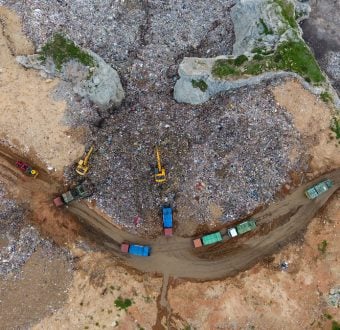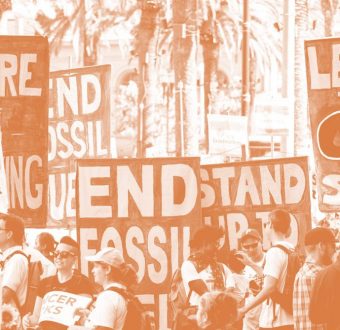The next few months are crucial to confronting our present crises of climate change, COVID-19, mass unemployment, and the deadly toll of white supremacy.
President Biden and Congress are debating historic legislation to “Build Back Better” by creating millions of good jobs, investing in a clean energy economy, and tackling this nation’s legacy of racial injustice.
But, we cannot truly Build Back Better unless we end fossil fuel racism.
Climate destruction is only possible in a world in which racism and racist systems are tolerated. The fossil fuel industry as a whole is one of those racist systems. It’s long past time to end fossil fuel racism — and in doing so, build a world in which all of us can thrive.
What is Fossil Fuel Racism?
Fossil fuel pollution directly harms millions of people. Air pollution from fossil fuels alone kills 350,000 people in the U.S. each year. Across the U.S., 17.6 million people live within one mile of an active oil or gas well, and more than 6.1 million people live within three miles of an oil and gas refinery. And of course, the climate crisis — which is primarily caused by burning fossil fuels — puts all us of at risk.
Fossil fuel pollution disproportionately harms Black, Brown, Indigenous, and poor communities. People of color — especially Black people — in the U.S. are more exposed to fine particulate matter pollution from burning fossil fuels, which contributes to respiratory illness and death.
Pollution from natural gas infrastructure, including pipelines, drilling sites, and processing plants, has increased the risk of cancer for one million Black Americans. It’s also contributed to 138,000 asthma attacks and 101,000 lost school days for Black children.

ExxonMobil Baytown refinery and petrochemical complex in Baytown. The Houston area has long been known as a major hub of the petrochemical and fossil fuel industry. As upstream profits in oil and gas production have declined, the fossil fuel industry has increasingly invested in petrochemical divisions as a potential bright spot, citing low price ethane feedstocks generated from the US fracking boom and increased demand for single-use plastics in the consumer goods sector.
In south Texas, both fracking wastewater wells and oil and gas flares disproportionately harm Latinx communities. Latina women in the Eagle Ford shale — the site of a major fracking boom — face a significantly higher risk of giving birth prematurely.
Fossil fuels are also the biggest driver of the climate crisis. Just 50 fossil fuel companies account for half of global greenhouse emissions. And, climate change puts Black, Brown, Indigenous, and poor communities in the U.S. and worldwide disproportionately at risk. Meanwhile, a small handful of overwhelmingly white fossil fuel executives are raking in millions of dollars in profits. This system isn’t fair.
It’s long past time to end fossil fuel racism — and in doing so, build a world in which all of us can thrive.
The fossil fuel industry is deeply embedded in this nation’s legacy of systemic racism. Recent studies reveal a relationship between racist policies of the past like redlining — racial discrimination in lending practices that contributed to housing segregation — and exposure to extreme heat, higher rates of asthma, and proximity to oil drilling today. Fossil fuel companies have also funded police organizations, making them complicit in an institution that oppresses Black and Brown communities.

Close-up portrait of Monica Gibbs with a breathing mask. Monica has suffered respiratory problems since birth. She lives near a refinery in Convent, Louisiana.
Their corroding influence doesn’t stop there. For years, the fossil fuel industry has worked behind the scenes, through corrupt lobbying groups like the American Legislative Exchange Council (ALEC), to advance voter suppression laws that also have a disproportionate impact on Black and Brown voters.
In the U.S., fossil fuels are produced on ancestral Native lands, meaning the fossil fuel industry depends on the shameful legacy of forced removal and genocide of Indigenous peoples. In fact, the first U.S. oil well, the Drake Well, was drilled in 1859 on ancestral Haudenosaunee (Iroquois) territory near Titusville, Pennsylvania, by a company perversely named the Seneca Oil Company.
Every stage of oil, gas, and coal production, along with the fossil fuel industry’s political activities, contributes to racial injustice. This has to end.
What can we do about it?
We can end fossil fuel racism by phasing out fossil fuels, building a democracy that works for all people, and investing in a just, sustainable, and dignified future for all communities. This year, we have an historic opportunity to enact a green and just recovery from the overlapping crises we face in a way that tackles the climate crisis and systemic racism at the same time.
Confronting fossil fuel racism is a crucial ingredient to ensure this recovery truly serves the needs of historically disadvantaged communities — and all of us. Efforts to tackle climate change that do not directly confront fossil fuels would only allow the racist health impacts of oil, gas, and coal pollution to continue endangering Black, Brown, Indigenous, and poor communities.
Fossil fuel executives have poisoned our environment, our bodies, and our democracy for long enough. Our leaders must be willing to look oil and gas CEOs in the eye and tell them their time is up. Ending fossil fuel racism means making life better for all of us. When we pursue solutions that protect those on the frontlines climate impacts and pollution, we give everyone the chance to thrive.

Greenpeace US activists walk a large Black Lives Matter banner down 16th NW toward the White House. Activists on the streets adopted the banner chanting “Make Way For The Flag” as they moved it through the massive crowds to the fence in front of Lafayette Square near the White House.
How can I take action?
Right now, President Biden and lawmakers in Congress are debating a once-in-a-generation infrastructure bill that has a shot at confronting fossil fuel racism and launching the green and just recovery we need. Contact your Members of Congress to demand they include bold measures to end fossil fuel racism in this historic legislative package, including:
- An end to fossil fuel subsidies
- A $10 trillion investment in a clean energy economy that advances workers’ rights, racial justice, and climate progress in line with the THRIVE Agenda
- Policies to strengthen environmental justice and ensure frontline communities lead the way to a more just future
- New federal programs to protect and employ workers and communities during the transition to a clean energy economy, including programs to clean up abandoned oil, gas, and coal infrastructure.
Ending fossil fuel racism means transitioning from an extractive economy to one that puts people’s health and planetary well-being first. We can create a world where everyone has a good life, where our fundamental needs — dignified work, healthcare, education, housing, clean air and water, healthy food — are met, and where people everywhere have what they need to thrive.





